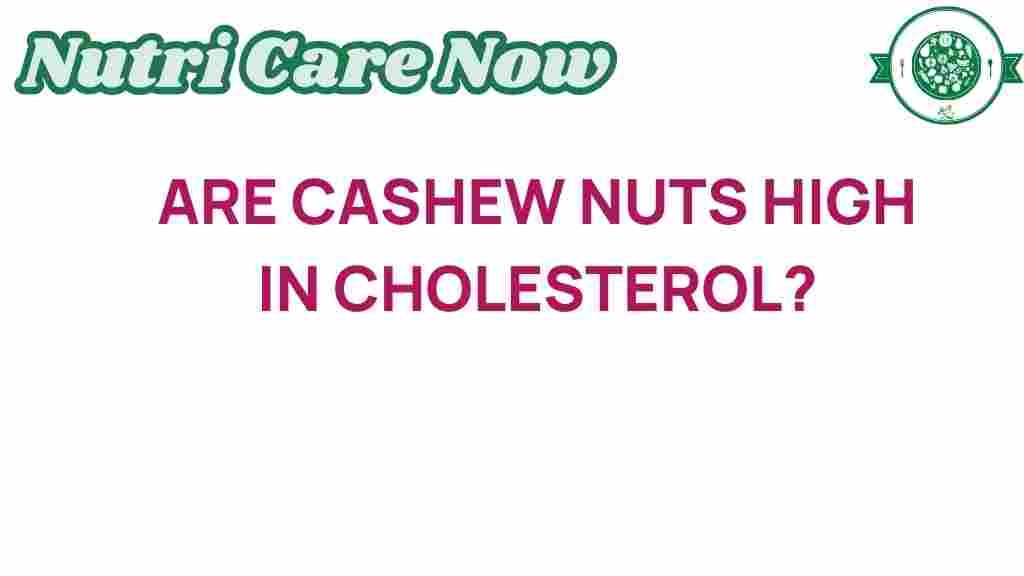Are Cashew Nuts a Hidden Cholesterol Threat?
Cashew nuts are a popular snack enjoyed by many for their rich flavor and crunchy texture. But as health-conscious individuals consider their dietary choices, a common question arises: Are cashew nuts a hidden cholesterol threat? In this article, we’ll explore the relationship between cashew nuts and cholesterol, uncover their health benefits, and analyze their role in a balanced diet.
The Nutritional Profile of Cashew Nuts
Before diving into the cholesterol debate, it’s essential to understand the nutritional profile of cashew nuts. These nuts are not only delicious but also packed with various nutrients that contribute to overall health. Here’s what you need to know:
- Calories: Cashew nuts are energy-dense, with approximately 553 calories per 100 grams.
- Fats: They contain about 44 grams of fat, predominantly healthy unsaturated fats.
- Protein: Cashews provide around 18 grams of protein per 100 grams.
- Carbohydrates: They have about 30 grams of carbohydrates, including dietary fiber.
- Vitamins and Minerals: Cashews are rich in magnesium, phosphorus, copper, and manganese, which are vital for various bodily functions.
Understanding Cholesterol
Cholesterol is a waxy substance found in your blood, essential for producing hormones, vitamin D, and substances that help digest foods. However, too much cholesterol can lead to health issues, particularly related to heart health. Cholesterol is classified into two main types:
- Low-Density Lipoprotein (LDL): Often referred to as “bad” cholesterol, high levels of LDL can lead to plaque buildup in the arteries, increasing the risk of heart disease.
- High-Density Lipoprotein (HDL): Known as “good” cholesterol, HDL helps remove other forms of cholesterol from your bloodstream.
Do Cashew Nuts Affect Cholesterol Levels?
When considering whether cashew nuts pose a cholesterol threat, it’s crucial to look at their fat content. Cashew nuts primarily contain unsaturated fats, which are known to be heart-healthy. Research suggests that incorporating unsaturated fats into your diet can help improve cholesterol levels by:
- Lowering LDL cholesterol.
- Increasing HDL cholesterol.
While cashew nuts do contain fats, the types of fats present are beneficial when consumed in moderation. They can be a part of a heart-healthy diet that supports optimal cholesterol levels.
Health Benefits of Cashew Nuts
Cashew nuts offer several health benefits that make them a valuable addition to your diet. Here are some notable advantages:
- Heart Health: The unsaturated fats, along with antioxidants found in cashews, contribute to improved heart health.
- Weight Management: Despite being calorie-dense, cashew nuts can aid in weight management. Their protein and fiber content can help you feel full, reducing the likelihood of overeating.
- Bone Health: The magnesium in cashews is crucial for bone health, as it helps with calcium absorption.
- Blood Sugar Control: Cashew nuts have a low glycemic index, making them a suitable snack for individuals managing blood sugar levels.
Incorporating Cashew Nuts into Your Diet
Adding cashew nuts to your diet can be simple and enjoyable. Here are some practical ways to incorporate them:
- Snacking: Enjoy a handful of raw or roasted cashew nuts as a nutritious snack.
- Incorporate into Meals: Add cashews to stir-fries, salads, or grain bowls for added crunch and nutrition.
- Cashew Butter: Use cashew butter as a spread on toast or in smoothies for a creamy texture.
- Baking: Include chopped cashews in baked goods like cookies or granola bars for extra flavor.
Potential Concerns and Troubleshooting Tips
While cashew nuts offer numerous health benefits, there are some considerations to keep in mind:
- Portion Control: Because cashew nuts are high in calories, it’s essential to practice portion control. A serving size is typically around 1 ounce (about 18 nuts).
- Allergies: Be cautious if you have a nut allergy, as cashews can trigger allergic reactions in sensitive individuals.
- Salt Content: If you choose salted cashews, be mindful of your sodium intake. Opt for unsalted varieties when possible.
For those looking to maintain heart health and manage cholesterol levels, choosing unsalted and raw varieties can be beneficial.
Cashew Nuts and Heart Health
Heart health is a significant concern for many individuals, and diet plays a crucial role. Research shows that diets rich in nuts, including cashew nuts, are associated with a lower risk of heart disease. The beneficial fats, fiber, protein, and essential nutrients in cashews contribute to heart health by:
- Reducing inflammation.
- Improving blood vessel function.
- Supporting healthy blood pressure levels.
Incorporating cashew nuts into a balanced diet, alongside other heart-healthy foods like fruits, vegetables, whole grains, and lean proteins, can significantly enhance your overall heart health.
Conclusion: Making Smart Dietary Choices
In conclusion, cashew nuts are not a hidden cholesterol threat. Instead, they are a nutritious snack that can contribute positively to your overall health, particularly heart health. Their healthy fats, vitamins, and minerals make them an excellent choice for those seeking to maintain a balanced diet.
When consuming cashew nuts, moderation is key. By being mindful of portion sizes and choosing raw or unsalted varieties, you can enjoy the benefits of cashew nuts without compromising your health.
For more information on heart-healthy eating, visit the American Heart Association. If you’re looking for recipes and tips on incorporating nuts into your diet, check out our culinary guide.
Incorporate cashew nuts into your snacking routine today and enjoy their myriad health benefits while making smart dietary choices for a healthier tomorrow.
This article is in the category Health and created by NutriCareNow Team
